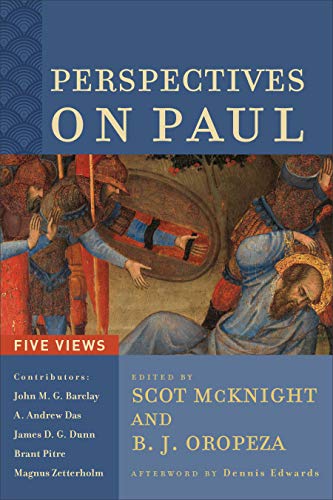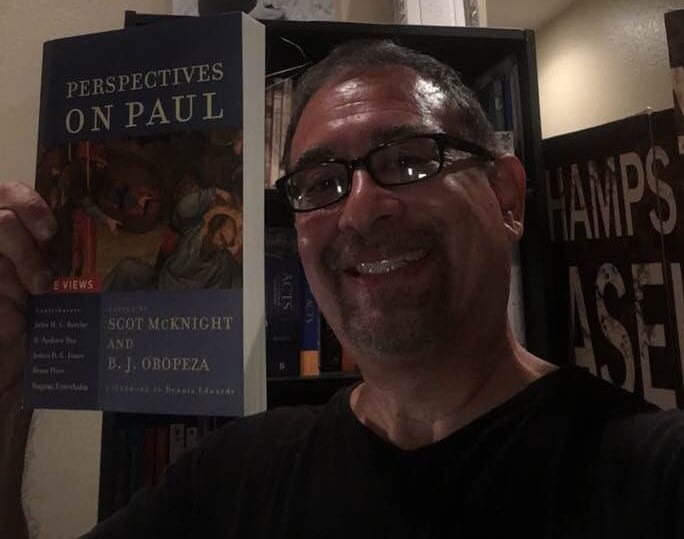There are quite a number of books on the Apostle Paul, but few reach the caliber of great books. We may have such a book here with the newly released, Perspectives on Paul: Five Views by Scot McKnight and B. J. Oropeza (Baker Academic, 2020). What makes it great? It is not just another book of viewpoints in which those with a special expertise on a particular theological slant present their respective positions. Rather, this book includes basically the All-Star or Super Bowl game of scholars who present their viewpoints and respond to the others in relation to Paul’s view of salvation and his understanding of Jews and gentiles.
The New Perspective on Paul

The authors begin this book by providing a history of biblical interpretation regarding the New Perspective on Paul, a viewpoint spearheaded by E. P. Sanders, James D. G. Dunn, and N. T. Wright. The perspective, in essence, holds that formative Judaism of Paul’s day, known as Second Temple Judaism, was a religion of grace. Prior to Sander’s groundbreaking work, Paul and Palestinian Judaism (Fortress Press, 1977), many Christian scholars, especially those influenced by the Protestant Reformation, taught that Judaism is typically a legalistic religion of righteousness by works. Many pastors still normally assume and teach this over the pulpits these days.
For Sanders and advocates of the New Perspective, membership into the covenant community of Judaism happens by grace, and staying in that covenant involves obedience to the law (Torah), hence, covenantal nomism. Prior to Paul’s transformation when he met the Lord Jesus on the way to Damascus (Acts 9; Galatians 1:15-16), his problem was not with guilt but Jewish privilege. Such was reflected against gentiles; they need to follow Mosaic law and be circumcised, if they are to become Jewish proselytes.
Although New Perspective scholars disagree among themselves on what exactly Paul’s problem is with Judaism, they agree that Paul denies the necessity for gentiles to be circumcised in order to be righteous (justified) before God. Paul’s ax to grind with Mosaic law does not center on human inability to keep the law perfectly, but whether gentiles are able to belong to God’s people without the observance of external identity indicators that mark out Jewish distinctiveness, such as circumcision and dietary rules.
Post-New Perspectives on Paul
After discussing the New Perspective, this work then addresses viewpoints and arguments that criticize the New Perspective, and the authors also address the more recent Post-New Perspective viewpoints, such as the “Radical New Perspective” (Paul within Judaism) which argues that Paul considered himself Jewish and never left Judaism or its practices after his Damascus experience. Other recent perspectives include, for example, the apocalyptic perspective of Douglas Campbell, the Reformation perspective rapprochements with the New Perspective (e.g., Michael Bird, Stephen Chester, and others), and John Barclay’s Gift Perspective.
The following chapters of the book present five viewpoints: two traditional perspectives (the Roman Catholic and Protestant positions), the New Perspective, and two Post-New Perspectives (Paul within Judaism, and the Gift Perspective). The scholars present these positions—Brant Pitre (Catholic), A. Andrew Das (Protestant), James D. G. Dunn (New), Magnus Zetterholm (Judaism), and John M. G. Barclay (Gift)—and each responds to the perspectives of the other four scholars. They also provide rejoinders to criticisms made against their position by the other four.
The final chapter is written by Dennis Edwards, a minister who assesses the various perspectives from a pastoral point of view. This chapter brings out some relevant talking points related to churches today.
The Five Views on Paul
The general content of the book is as follows:
Introductory chapter: “Paul in Perspective: An Overview of the Landscape More Than Forty Years after Paul and Palestinian Judaism”— B. J. Oropeza and Scot McKnight
- The Romans Catholic Perspective on Paul — Brant Pitre
Traditional Protestant Perspective Response to Pitre A. Andrew Das
New Perspective Response to Pitre James D. G. Dunn
Paul within Judaism Perspective Response to Pitre Magnus Zetterholm
Gift Perspective Response to Pitre John M. G. Barclay
Romans Catholic Perspective Reply to the Respondents Brant Pitre
- The Traditional Protestant Perspective on Paul — Andrew Das
Roman Catholic Perspective Response to Das Brant Pitre
New Perspective Response to Das James D. G. Dunn
Paul within Judaism Perspective Response to Das Magnus Zetterholm
Gift Perspective Response to Das John M. G. Barclay
Traditional Protestant Perspective Reply to Respondents A. Andrew Das
- The New Perspective on Paul — James D. G. Dunn
Roman Catholic Perspective Response to Dunn Brant Pitre
Traditional Protestant Perspective Response to Dunn A. Andrew Das
Paul within Judaism Perspective Response to Dunn Magnus Zetterholm
Gift Perspective Response to Dunn John M. G. Barclay
New Perspective Reply to the Respondents James D. G. Dunn
- The Paul within Judaism Perspective — Magnus Zetterholm
Roman Catholic Perspective Response to Zetterholm Brant Pitre
Traditional Protestant Perspective Response to Zetterholm A. Andrew Das
New Perspective Response to Zetterholm James D. G. Dunn
Gift Perspective Response to Zetterholm John M. G. Barclay
Paul within Judaism Perspective Reply to the Respondents Magnus Zetterholm
- The Gift Perspective on Paul — John M. G. Barclay 219
Romans Catholic Perspective Response to Barclay Brant Pitre
Traditional Protestant Perspective Response to Barclay A. Andrew Das
New Perspective Response to Barclay James D. G. Dunn
Paul within Judaism Perspective Response to Barclay Magnus Zetterholm
Gift Perspective Reply to the Respondents John M. G. Barclay
Afterword: Pastoral Reflections on Perspectives on Paul: Five Views Dennis Edwards
This book also contains Author, Scripture, and Subject Indexes
Perspectives on Paul is available through Kindle, paperback, and hardback.
Author and Editor B. J. Oropeza poses with the book:

Here are some of endorsements made regarding the book:
“To have a summary of scholarship on Pauline theology is good. To have the experts speak for themselves is better. But to have back-and-forth conversation among experts, such as we find in Perspectives on Paul, is a gift. If you find yourself confused about or behind on the study of Paul, look no further. I found the thoughtful engagement in this book very insightful.” —Nijay K. Gupta, professor of New Testament, Northern Seminary
“Three Protestant Pauls, a Catholic Paul, and a Jewish Paul all walk into one volume–and collegial colloquy ensues. The scholars assembled here communicate the key issues, arguments, and interpretations that currently shape our highly charged moment in Pauline studies. Perspectives on Paul makes and marks an energetic contribution to important developing conversations.” — Paula Fredriksen, The Hebrew University, Jerusalem
“For many readers, Paul is perplexing–there is the New Perspective, the Old Perspective, and a variety of other perspectives. McKnight and Oropeza have provided a much needed and highly accessible summary of the way E. P. Sanders’s Paul and Palestinian Judaism has impacted Pauline scholarship in the last forty years. This volume, with five different approaches to reading Paul, offers a one-stop shop for those desiring to understand the dominant perspectives in conversation with other prominent and influential voices.”— Jeanette Hagen Pifer, assistant professor of New Testament, Talbot School of Theology, Biola University













